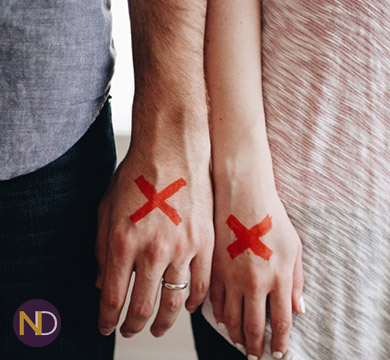Recently, self-destructive behavior has overtaken large segments of the population. The number of children, adolescents, and adults who have signs of self-destructive behavior is growing every year. Therefore, we are going to discuss what is self-destructive behavior and how to stop being self-destructive.

Defining Self-Destructive Behavior
Self-destructive behavior is a type of deviant behavior, characterized by actions aimed at causing any damage to one's own physical, psychological, and social well-being. The consequence of such behavior is the physical or mental destruction of the individual.
Self-destructive behavior in relationships can manifest itself in drunkenness, drug addiction, problem gambling, smoking, a tendency to hazardous occupations and extreme sports, aggressive behavior, workaholism, a tendency to various kinds of operations to “improve” appearance, risky sexual behavior, etc.
The basis of self-destructive behavior is not so much the subconscious desire for death (according to Freud and his followers) as the inability of the individual to accept the meaning of life and experience positive emotions. Self-destructive behavior causes can be both genetic and social.
Modern parenting techniques do not allow most people to cope with life difficulties constructively. In this case, the mechanisms of psychological protection are aimed to avoid dealing with existing problems. The result is a simplification of the personality and its gradual deterioration.
Signs of Self-Destructive Behavior
Recognizing self-destructive behaviors in a grown-up man can be very difficult. People tend to hide manifestations of self-destruction, as they are afraid to see the negative reaction of others, which can make their situation much worse. If you suppose that your loved one has self-destructive tendencies, you should pay attention to the following self-destructive behavior signs:
 reticence and irritability;
reticence and irritability;- complaints of physical ailments (headaches, fatigue, apathy, lack of appetite, insomnia)
- unusual disregard for one’s own hobbies, a feeling of boredom and indifference to the things that brought joy before;
- frequent desire to be alone;
- an increase in the use of psychoactive substances (alcohol, drugs, cigarettes);
- self-criticism (self-condemnation, words about one’s own inferiority);
- fits of anger;
- new or healed wounds, burns, and bruises;
- long sleeves or trouser legs, especially in hot weather;
- suicidal tendencies, the desire to disappear.
There are 3 clear signs of self-destructive behavior when you need to ring the alarm:
- suicidal attempts,
- refusal to eat,
- self-inflicted bodily harm (cuts, burns, beating).
If you notice such critical manifestations of self-destructive behavior in a loved one, you should immediately seek help from professionals (psychiatrists, psychotherapists, or psychologists) to prevent a negative outcome of the situation. What is more, the initiator of visiting a doctor or calling a psychiatric team should be someone who noticed the signs of self-destructive behavior since the person themselves cannot assess the situation rationally and will not ask for help.
In society, there are relatively supported forms of self-destructive behavior, which are quite popular as ways to relieve stress. They can be expressed in:
- use of drugs, alcohol, and tobacco in stressful situations;
- craving for extreme sports and leisure time, the choice of a hazardous field of activities;
- minor destructive behavioral reactions (tearing off scabs from healing wounds, biting nails and lips to blood, etc.).
A person with such manifestations of self-destructive behavior does not need its immediate treatment. They just should take some prevention measures.
How to Help Someone with Self-Destructive Behavior?
Do you wonder how to stop self-destructive behavior in relationships? The first thing you should do if you find out that your loved one is a self-destructive personality – to not blame them. This is not a consequence of “bad temper” or “depravity.” In general, self-destruction is hardly controlled by will-power. Simply put, your partner does not behave this way because they are a “bad,” “stubborn,” or “hysterical” person who likes to harm themselves and scare others. You should show your loved one that you support them and want them to be happy without harm to health. After all, it is so important to a person with self-destructive behavior. You can help them by showing your care and love. You should be there in difficult moments, showing that you accept your loved one with all their problems and shortcomings and that they can confide in you. Praise them more often and do not criticize, avoid humiliating and insulting statements.
It is very good if you stand together with a loved one because they feel that they can honestly talk about the problem with the closest person. To understand your beloved better, you should browse the Internet to learn some self-destructive behavior examples. Your support is especially valuable in cases when the partner is already ready to break down and harm themselves (if you manage to notice this state). If you do not have the opportunity to contact a specialist at the moment of aggravation of self-destructive behavior, ask the partner to write down their feelings, and then burn away or tear this piece of paper, beat the pillow, cut a vegetable from the refrigerator, and so on.
Self-disruptive behavior is dangerous in itself, and also may indicate some mental disorders. Therefore, it is best to ask for psychological and psychiatric help. You can start with any of the specialists: a non-medical psychotherapist/psychologist or a psychiatrist/medical psychotherapist. How to understand whether a psychologist will help your loved one get rid of self-destructive tendencies?
If a specialist says that your partner has only themselves to blame and “just wants to attract attention with such behavior,” it means that you've got a bad psychologist or a poorly qualified doctor. If they compare the sufferings of your loved one with someone else’s, devaluing them (for example, they say, “Some people are terminally ill and would give everything to reverse roles with you, but you don’t value your life”) and give “simple” tips like, “You should build your personal life, get married, and have a baby,” promising that it will cure your partner – this is also a reason to turn to another specialist.
 A competent psychiatrist or psychologist will not say anything from the above mentioned but ask in detail how long the symptoms of self-destructive behavior last, under what circumstances they've appeared, and find out other details and peculiarities of the emotional state of your partner. Almost all the conditions when a person demonstrates self-destructive behavior require both medical correction and psychological support. So, a conscientious psychiatrist will recommend psychological treatment along with medication. It is the best way on how to stop self-destructive behavior. The most important thing is to admit that the problem exists, and not be afraid to ask for help.
A competent psychiatrist or psychologist will not say anything from the above mentioned but ask in detail how long the symptoms of self-destructive behavior last, under what circumstances they've appeared, and find out other details and peculiarities of the emotional state of your partner. Almost all the conditions when a person demonstrates self-destructive behavior require both medical correction and psychological support. So, a conscientious psychiatrist will recommend psychological treatment along with medication. It is the best way on how to stop self-destructive behavior. The most important thing is to admit that the problem exists, and not be afraid to ask for help.
Self-Destructive Behavior in Relationships
Psychologists divide people with self-destructive behavior into six categories. Let's take a look at each of them and find out how self-destructive people behave in relationships.
1. Controllers. Being in a relationship, such people try to control every step of a loved one. A person whom they control does not grow spiritually but becomes dependent. Controllers believe that they know better how others should live and act. They do not allow other people to be themselves. The controller does not know how to trust people, and they usually try to play the role of God in the lives of others.
2. Pleasers. Their self-esteem is based on pleasing everyone. They never declare their needs, and therefore, they are always in a state of emotional hunger. They want to be important, valuable in their surroundings, and to anticipate the wishes of other people. Their life motto is: "Peace at any cost." In relationships, they care about the desires and needs of a loved one without focusing on themselves. They find it difficult to answer the questions, "What do you like, what do you want, what are your desires?" Pleasers pay a high price, lose their individuality, and become a shadow of a loved one. They are always looking for someone who will appreciate their actions and efforts.
3. Martyrs. They learned that life means constant suffering; they seek pain because this is to be expected. Romantic relationships with such a person are very difficult and exhausting. They look only on the dark side of things. A martyr often craves for travails and if it does not happen, they often provoke scandals themselves so that the sufferings do not stop but even intensify.
4. Workaholics. Their self-esteem is based on occupation. Completion is not their goal, they need constant movement. An eventual result is not important for them, the main thing is the process itself. They feel guilty when they do nothing and usually do not know how to relax. Of course, workaholics appreciate work more than romantic relationships.
5. Perfectionists. They consider everything being based on a fictional ideal. Their motto is: "Everything must be perfect!" Perfectionists perceive their mistakes as a defeat. Their principle is: "All or nothing!" Moreover, they are often overtaken with the fear of failure. In a relationship, they are critical and demanding. They find it difficult to accept people as they are.
6. Freemen. Their life motto is: "Freedom first!" They are focused on freedom, therefore, do not build close relationships. They have a lot of social connections that help them feel important and needed. They do not invest much in a romantic relationship. Freemen build relationships only with those who give them a lot of personal space.
Your Comment
Log In Or Sign Up
To Leave Your Comment